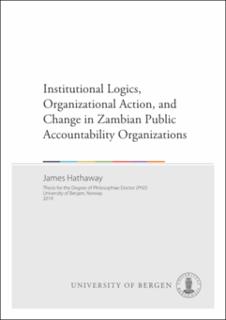| dc.description.abstract | Public organizations in Sub-Saharan Africa have been perceived as schizophrenic and guided by incompatible ideas deriving from their local norms, colonial histories, and development paradigms, which is thought to constrain action and impede organizational change. This study analyzes these tensions using an institutional logics perspective in three case studies at public accountability organizations in Zambia: the Office of Auditor General, the Anti-Corruption Commission, and the ombudsman office. Institutional logics are understood as the different sets of values, principles, practices, and social structures that can guide organizational and individual behavior. This study shows how alternative logics were introduced in the organizations, and it examines the relationships between the different logics and how they affect organizational action. The study also presents a case of change in one of the organizations, which came through a process of institutional entrepreneurship and the organization’s engagement with a well-established international professional community. The analyses and findings from this study, which are based on qualitative data that primarily come from interviews and documentary sources, contribute to theories and literature on institutional logics and development. It develops a typology of logics useful for research on public organizations in Sub-Saharan Africa, and it demonstrates how different types of relationships can exist between these logics, in which some relationships are complimentary and can facilitate organizational action, while others are competitive and can hinder organizational action. The study also contributes to our understanding of the materiality of logics by showing how a move between office buildings was a material expression and enabling condition for the enactment of a logic. Finally, the study contributes to theories on institutional entrepreneurship and change and engages in ongoing discussions about the paradox of embedded agency, as it shows how an institutional entrepreneur was drawn toward certain courses of action through her history of social positioning across organizations, which she then applied in her current leadership position where she drove a process of organizational change. By using theoretical perspectives normally found in research on organizations in the Global North, this study moves the literature further toward theorizing the contexts of public organizations in the Global South, while it also leads to a better understanding of organizational behavior more broadly. | en_US |
